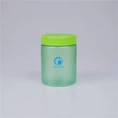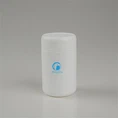Pressure sensitive aluminum foil and heat sealing induction aluminum foil have good sealing performance, it is difficult to simply say which sealing effect is absolutely better, depending on a variety of factors and application scenarios, the following is a comparative analysis of the sealing effect of the two:
Pressure sensitive aluminum foil
Sealing principle: pressure sensitive aluminum foil relies on the viscosity of pressure sensitive adhesive to achieve sealing. When subjected to a certain pressure, the pressure-sensitive adhesive will undergo viscous deformation and fill the small gaps and irregularities on the surface of the sealed object, thus forming a seal.
Sealing advantage
Easy operation: no additional heating and other equipment is required, only a certain pressure can be applied to complete the sealing, such as pressure sensitive aluminum foil tape, can be directly pasted sealing, in some emergency or small-scale sealing scenarios have obvious advantages.
Strong adaptability: can better adapt to different shapes, materials of the sealing surface, can be used for pipe sealing, irregular objects packaging sealing.
Partially reusable: under certain conditions, if it needs to be re-opened and re-sealed after sealing, the pressure-sensitive aluminum foil can be sealed again as long as the viscosity is still there.
Sealing limitations: Viscosity may be affected by ambient temperature, humidity and other factors. In high temperature environment, the pressure sensitive adhesive may become soft, resulting in too strong viscosity and even flowing, affecting the sealing effect and appearance; At low temperatures, the pressure sensitive adhesive may become hard and brittle, and the viscosity is reduced, so that the firmness of the seal is reduced. After long-term use, the viscosity of the pressure-sensitive adhesive may also gradually weaken, affecting the long-term effect of sealing.
Heat seal induction aluminum foil
Sealing principle: The heat sealing induction aluminum foil uses electromagnetic induction to generate heat, so that the heat sealing layer or coating of the aluminum foil melts under the action of heat, and then fuses with the surface of the sealed object under pressure, and forms a seal after cooling.
Sealing advantage
High sealing strength: the sealing formed by heating fusion can form a firm combination between the aluminum foil and the sealed object, and the sealing effect is good, and can effectively block the leakage of gas, liquid, etc., which is often used in the packaging of drugs and food with high sealing requirements.
Durable and stable sealing: Once the seal is completed, under normal storage and use conditions, it is not easy to have a seal failure, and can maintain good sealing performance for a long time and extend the shelf life of the product.
Good tamper-proof performance: After the heat seal induction seal, if it is opened, it will usually destroy the seal structure, leaving obvious traces, and has a good tamper-proof function.
Sealing limitations: Professional induction sealing equipment is required to generate electromagnetic induction heat to achieve sealing, and it is inconvenient to use for scenarios without relevant equipment. The process parameters of the sealing operation require high requirements, such as temperature, pressure, time, etc. If the parameters are improperly set, it may lead to problems such as weak sealing and aluminum foil damage.
Pressure sensitive or heat sealing induction aluminum foil which seal better
Feb 24, 2025Leave a message
Send Inquiry
















